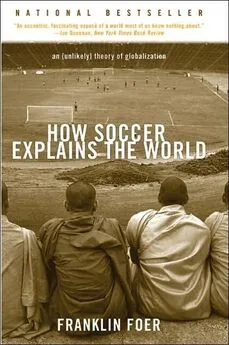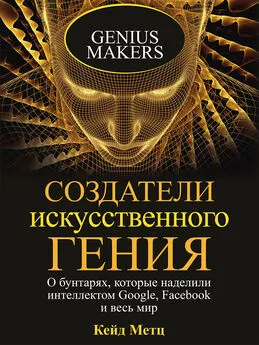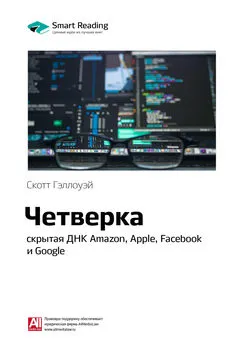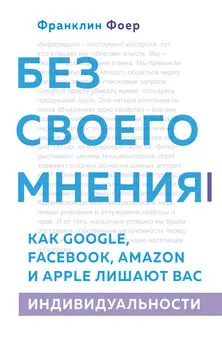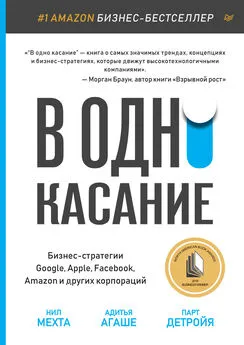Франклин Фоер - Без своего мнения [Как Google, Facebook, Amazon и Apple лишают вас индивидуальности] [litres]
- Название:Без своего мнения [Как Google, Facebook, Amazon и Apple лишают вас индивидуальности] [litres]
- Автор:
- Жанр:
- Издательство:Литагент 5 редакция «БОМБОРА»
- Год:2020
- Город:Москва
- ISBN:978-5-04-108613-8
- Рейтинг:
- Избранное:Добавить в избранное
-
Отзывы:
-
Ваша оценка:
Франклин Фоер - Без своего мнения [Как Google, Facebook, Amazon и Apple лишают вас индивидуальности] [litres] краткое содержание
Без своего мнения [Как Google, Facebook, Amazon и Apple лишают вас индивидуальности] [litres] - читать онлайн бесплатно ознакомительный отрывок
Интервал:
Закладка:
156. Bagdikian, 16.
157. Wu, Master Switch, 219–21.
158. Robert W. McChesney and John Nichols, The Death and Life of American Journalism (Nation Books, 2010), 152.
159. André Schiffrin, The Business of Books (Verso, 2000), 1.
160. Bennett Cerf, At Random (Random House, 1977), 285.
161. Tom Standage, The Victorian Internet (Bloomsbury, 2014), 215.
162. Paul Starr, The Creation of the Media (Basic Books, 2004), 171–73.
163. Starr, 176.
164. Menahem Blondheim, News over the Wires (Harvard University Press, 1994), viii.
165. Blondheim, 151.
166. David Hochfelder, The Telegraph in America, 1832–1920 (Johns Hopkins University Press, 2012), 44.
167. Starr, 177.
168. Wu, Master Switch, 22.
169. Starr, 187.
170. Jonathan Zittrain, “Facebook Could Decide an Election Without Anyone Ever Finding Out,” New Republic, June 1, 2014.
171. Joshua Green, “Google’s Eric Schmidt Invests in Obama’s Big Data Brains,” BloombergBusinessweek, May 31, 2013.
172. “Obama for America uses Google Analytics to democratize rapid, data-driven decision making,” Google Analytics Case Study, 2013.
173. Steve Lohr and David Streitfeld, “Data Engineer in Google Case Is Identified,” New York Times, April 30, 2012; David Streitfeld, “Google Is Faulted for Impeding U.S. Inquiry on Data Collection,” New York Times, April 14, 2012.
174. Robert Epstein, “How Google Could Rig the 2016 Election,” Politico, August 19, 2015; Robert Epstein and Ronald E. Robertson, “The Search Engine Manipulation Effect (SEME) and Its Possible Impact on the Outcomes of Elections,” Proceedings of the National Academy of Sciences 112, no. 33 (August 18, 2015): E4512–21.
175. Les Brown, “Subliminal Ad Pops Up in National TV Promotion,” New York Times, December 27, 1973.
176. Greg Bensinger, “Competing with Amazon on Amazon,” Wall Street Journal, July 27, 2012.
177. Jonah Peretti, “Mormons, Mullets, and Maniacs,” New York Viral Media Meetup, August 12, 2010.
178. Michael Schudson, The Sociology of News (W. W. Norton, 2011), 73.
179. John Morton Blum, ed., Public Philosopher: Selected Letters of Walter Lippmann (Ticknor & Fields, 1985), 133–34.
180. Lippmann, Liberty and the News, 5.
181. Robert Darnton, “Writing News and Telling Stories,” Daedalus 104, no. 2 (Spring 1975): 175–94.
182. Taylor, 87.
183. “The Worst Jobs of 2015,” CareerCast.com.
184. Andy Serwer, “Inside the Mind of Jonah Peretti,” Fortune, December 5, 2013.
185. James Fallows, “Learning to Love the (Shallow, Divisive, Unreliable) New Media,” Atlantic, April 2011.
186. “Innovation,” New York Times, March 24, 2014.
187. “Hello again,” Joshua Topolsky blog, July 11, 2015.
188. Andrew Sullivan, “Guess Which Buzzfeed Piece Is An Ad,” The Dish blog, February 21, 2013.
189. Evan Osnos, “Embrace the Irony,” New Yorker, October 13, 2014.
190. Simon van Zuylen-Wood, “Larry Lessig, Off the Grid,” New Republic, February 5, 2014.
191. Lawrence Lessig, “Laws That Choke Creativity,” TED, March 2007.
192. T. S. Eliot, Selected Essays 1917–1932 (Harcourt, Brace and Company, 1932), 182.
193. Taylor, 23.
194. Robert Levine, Free Ride (Doubleday, 2011), 84.
195. Clay Shirky, Cognitive Surplus (Penguin, 2010), 82.
196. Thomas L. Friedman, “Collaborate vs. Collaborate,” New York Times, January 12, 2013.
197. Thomas Aquinas, Basic Writings of St. Thomas Aquinas, vol. 1, ed. Anton C. Pegis (Random House, 1945), 312.
198. Mark Rose, Authors and Owners (Harvard University Press, 1993), 18.
199. Percy Lubbock, ed., The Letters of Henry James: Volume 1 (Charles Scribner’s Sons, 1920), 424.
200. William Wordsworth, The Poems of William Wordsworth (Methuen and Co., 1908), 516.
201. Martha Woodmansee and Peter Jaszi, eds., The Construction of Authorship (Duke University Press, 1994), 5.
202. Siva Vaidhyanathan, Copyrights and Copywrongs (New York University Press, 2001), 50.
203. Vaidhyanathan, 45.
204. Robert Spoo, Without Copyrights (Oxford University Press, 2013), 42.
205. Jenny Hartley, ed., The Selected Letters of Charles Dickens (Oxford University Press, 2012), 96.
206. Rudyard Kipling, Kipling’s America: Travel Letters, 1889–1895, ed. D. H. Stewart (Johns Hopkins University Press, 2003), xx.
207. Henry Holt, “The Commercialization of Literature,” Atlantic Monthly, November 1905.
208. Frederick Anderson, Lin Salamo, Bernard L. Stein, eds., Mark Twain’s Notebooks & Journals, Volume II, 1877–1883 (University of California Press, 1975), 414.
209. John William Crowley, The Dean of American Letters (University of Massachusetts Press, 1999), 11.
210. Crowley, 11.
211. Holt, “Commercialization of Literature.”
212. Ernest Hemingway, Green Hills of Africa (Scribner, 2015), 50.
213. James L. W. West III, ed., F. Scott Fitzgerald, My Lost City: Personal Essays, 1920–1940 (Cambridge University Press, 2005), 189.
214. William J. Quirk, “Living on $500,000 a Year,” American Scholar, Autumn 2009.
215. Alfred Kazin, Starting Out in the Thirties (Atlantic Monthly Press, 1962), 15.
216. Lewis A. Coser, Charles Kadushin, Walter W. Powell, Books: The Culture and Commerce of Publishing (University of Chicago Press, 1985), 233.
217. Authors Guild, “The Wages of Writing,” 2015 Member Survey, September 2015.
218. William J. Baumol and William G. Bowen, Performing Arts (Twentieth Century Fund, 1966).
219. Jason Epstein, Book Business (W.W. Norton, 2001), 1.
220. “Chris Anderson on the Economics of ‘Free,’ ” Der Spiegel, July 28, 2009.
221. Kevin Kelly, What Technology Wants (Viking, 2010), 237.
222. Kevin Kelly, “Scan This Book!” New York Times Magazine, May 14, 2006.
223. Kelly, “Scan This Book!”
224. Evgeny Morozov, To Save Everything, Click Here (PublicAffairs, 2013), 292.
225. Shane Greenstein, How the Internet Became Commercial (Princeton University Press, 2015). Излагая историю приватизации Интернета, я в основном опирался на этот источник.
226. Ceruzzi, 321.
227. “Competition and Deregulation: Striking the Right Balance,” Remarks of William E. Kennard, United States Telecom Association Annual Convention, October 18, 1999.
228. Wu, Master Switch, 6.
229. Bruce Schneier, Data and Goliath (W. W. Norton, 2015), 2.
230. Schneier, 22.
231. Carl Shapiro and Hal R. Varian, Information Rules (Harvard Business School Press, 1999), 175.
232. Ariel Ezrachi and Maurice E. Stucke, Virtual Competition (Harvard University Press, 2016), 71.
233. Thurman W. Arnold, The Folklore of Capitalism (Beard Books, 2000), 66.
234. Arnold, 217.
235. Nomination of Thurman W. Arnold, Hearings Before a Subcommittee of the Committee on the Judiciary, United States Senate, 75th Congress, 3rd session, March 11, 1938, 5.
236. Michael J. Sandel, Democracy’s Discontent (Harvard University Press, 1996), 241.
237. Sandel, 240.
238. “Too Much of a Good Thing,” Economist, March 26, 2016.
239. K. Sabeel Rahman and Lina Khan, “Restoring Competition in the U.S. Economy,” Roosevelt Institute Report, June 2016.
240. Jeffrey Rosen, Louis D. Brandeis (Yale University Press, 2016), 48.
241. Neil Richards, Intellectual Privacy (Oxford) University Press, 2015), 95.
242. Rosen, 22.
243. Louis D. Brandeis and Norman Hapgood, Other People’s Money (F. A. Stokes, 1914), 142.
244. Stone, 290–91.
245. Robb Mandelbaum, “When Amazon Collects Sales Tax, Some Shoppers Head Elsewhere,” New York Times, April 28, 2014.
246. Stone, 287.
247. Stone, 294.
248. Harry Davies and Simon Marks, “Revealed: How Project Goldcrest Helped Amazon Avoid Huge Sums in Tax,” Guardian, February 18, 2016; Simon Marks, “Amazon: How the World’s Largest Retailer Keeps Tax Collectors at Bay,” Newsweek, July 13, 2016.
249. Davies and Marks, “Revealed”; Gaspard Sebag and David Kocieniewski, “What Is Amazon’s Core Tech Worth? Depends on Which Taxman Asks,” BloombergTechnology, August 22, 2016.
250. “Fortune 500 Companies Hold a Record $2.4 Trillion Offshore,” Citizens for Tax Justice, March 3, 2016.
251. “Facebook’s Multi-Billion Dollar Tax Break,” Citizens for Tax Justice, February 14, 2013.
252. David Leonhardt, “The Big Companies That Avoid Taxes,” New York Times, October 18, 2016.
253. David Dayen, “The Android Administration,” Intercept, April 22, 2016.
254. “Mission Creep-y,” Public Citizen report, November 2014.
255. Dayen, “Android Administration.”
256. Brody Mullins, Rolfe Winkler, and Brent Kendall, “Inside the U.S. Antitrust Probe of Google,” Wall Street Journal, March 19, 2015.
257. McChesney and Nichols, Death and Life, 151.
258. Warren J. Belasco, Appetite for Change (Cornell University Press, 2007), 62.
259. Belasco, 49.
260. Belasco, 48.
261. Michael Pollan, “The Food Movement, Rising,” New York Review of Books, June 10, 2010.
262. Michael Wolff, Television Is the New Television (Portfolio/Penguin, 2015), 50.
263. John Herrman, “Mutually Assured Content,” The Awl, July 30, 2015.
264. Wolff, 73.
265. Taylor, 184.
266. George Orwell, “Books v. Cigarettes,” The Collected Essays, Journalism and Letters of George Orwell (Harcourt, Brace & World, 1968), 94.
267. Orwell, 95–96.
268. Alan Bilton, Silent Film Comedy and American Culture (Palgrave Macmillan, 2013), 16.
269. Public Relations, Edward Bernays and the American Scene (F. W. Faxon Company, 1951), 19.
270. Larry Tye, The Father of Spin (Henry Holt and Company, 1998), 52.
271. Ted Striphas, The Late Age of Print (Columbia University Press, 2009), 29.
272. Striphas, 28.
273. Raymond Williams, Keywords (Oxford University Press, 1976), 87.
274. Williams, 87.
275. Rosen, 48.
276. Pierre Bourdieu, Distinction (Harvard University Press, 1984), 6.
277. Kevin Kelly, The Inevitable (Viking, 2016), 81.
278. MG Siegler, “Nicholas Negroponte: The Physical Book Is Dead In 5 Years,” TechCrunch, August 6, 2010.
279. U.S. Publishing Industry’s.
280. Annual Survey Reveals Nearly $28 Billion in Revenue in 2015,” Association of American Publishers, July 11, 2016.
281. Steven Roger Fischer, A History of Reading (Reaktion Books, 2003), 27.
282. Fischer, 202–3.
283. Michel Serres, Conversations on Science, Culture, and Time, trans. Roxanne Lapidus (University of Michigan Press, 1995), 171–72.

Примечания
1
Название созвучно слову underwear, "нижнее белье". – Прим. перев .
2
Интервал:
Закладка:
![Обложка книги Франклин Фоер - Без своего мнения [Как Google, Facebook, Amazon и Apple лишают вас индивидуальности] [litres]](/books/1074437/franklin-foer-bez-svoego-mneniya-kak-google-faceb.webp)


![Анетте Яспер - Зубы. Как у вас дела? [litres]](/books/1061196/anette-yasper-zuby-kak-u-vas-dela-litres.webp)
![Роман Васин - Вернувшийся [litres]](/books/1063070/roman-vasin-vernuvshijsya-litres.webp)
![Андреас Штипплер - Мышцы. Как у вас дела? [litres]](/books/1064734/andreas-shtippler-myshcy-kak-u-vas-dela-litres.webp)
